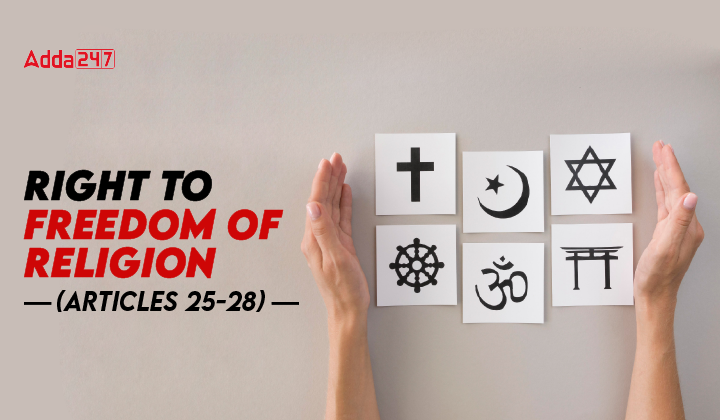Table of Contents
India is renowned as the birthplace of diverse religions, fostering spirituality, culture, and philosophical ideas. Religion holds varied meanings for individuals, with belief and personal choice being paramount. For those finding purpose and meaning in religion, strong faith drives their beliefs. Dedicated followers go to great lengths to uphold their commitment to their respective faiths.
Articles 25-28
The Indian Constitution’s provisions on religious freedom, enshrined in Part III, ensure crucial rights for citizens. Articles 25–28 guarantee the freedom of religion, allowing every Indian citizen to practice the religion of their choice. India’s secular status ensures this fundamental right for all its citizens.
A Secular State: What Is It?
- A state considered secular is one in which there is no recognized state religion. Secularism is explained in more detail in the S.R. Bommai v. Union of India case, where it was decided that “Secularism is the basic feature of the Indian Constitution.”
- Secular activity and religion are incompatible in religion being a matter of personal faith.
Idea of religious freedom
- Every citizen has the freedom to preach, practice, and spread the religion of their choice.
- This right also gives everyone the chance to propagate it without worrying about government interference. Additionally, the state expects it to be practiced peacefully inside the nation’s borders.
- India is a diverse country in terms of caste, ethnicity, religion, and community. In terms of exercising one’s religious beliefs, India is impartial, neutral, and unbiased.
- Our Indian Constitution guarantees that no citizen will be denied the ability to practice and publicly declare their faith.
The Indian Constitution’s notion of secularism
- Under the Indian Constitution, the term “secularism” is used often.
- The word “Secular” was added to our preamble by the 42nd amendment to the Indian Constitution in 1976.
- Our Constitution regards secularism with the highest regard and gives this notion the utmost importance.
- Legal authorities recognize secularism with dignity and hold it in high regard.
- The Constitution states that this right is given to each person so that they can openly and without hesitation declare what religion they believe in or wish to practice.
Constitutional Clauses
The Indian Constitution’s Articles 25–28 provide every citizen living on Indian soil the freedom to practice their faith.
- Article 25- Liberty of conscience and unrestricted practice of one’s faith.
- Article 26- The ability to oversee religious affairs
- Article 27- The right not to pay taxes to support a specific religion
- Article 28- The right to freely follow religious instructions
Article 25
Freedom of conscience and the right to freely profess, practice, and propagate religion
- All people have an equal right to freedom of conscience and the freedom to freely profess, practice, and propagate religion, subject to the laws of public order, morality, and health, as well as the other provisions of this Part.
- This article does not alter the operation of any current laws or prohibit the State from enacting new ones.
- It also does not prohibit the State from
- (a) regulating or restricting any economic, financial, political, or other secular activity that may be linked to religious practice;
- (b) offering social welfare and reform programs or opening Hindu religious institutions of a public nature to all Hindu classes and sections.
Article 26
The ability to freely oversee religious matters
Every religious denomination, or any portion thereof, shall have the right, subject to public order, morality, and health, to
- (a) create and operate organizations for religious and charitable purposes, and
- (b) govern its affairs concerning matters of faith.
- (c) to possess and acquire both immovable and mobile property, and
- (d) to manage said property in compliance with legal requirements.
Article 27
Freedom to pay taxes for the advancement of any specific faith
It is forbidden for anybody to be forced to pay taxes whose earnings are expressly designated to cover costs associated with advancing or preserving any certain religion or denomination.
Article 28
Freedom to attend religious worship or teaching in some educational institution
- State-funded educational institutions are prohibited from providing religious instruction.
- However, institutions established under trusts or endowments requiring religious instruction are exempt from the above rule.
- Students attending state-recognized educational institutions or receiving state aid are not compelled to participate in religious instruction or worship, unless they or their guardians have given consent under Cultural and Educational Rights, particularly for minors.
In summary
Religion is an important part of human life. It has a crucial role in influencing people’s thoughts. Religion is an essential factor in determining people’s conduct and behavior, particularly in Indian civilization. Indians are fiercely protective of their faith, and they get suspicious of anyone who tries to undermine it. To prevent any sort of future risk, it is essential to exercise this right with some decorum.



 TSPSC Group 1 Question Paper 2024, Downl...
TSPSC Group 1 Question Paper 2024, Downl...
 TSPSC Group 1 Answer key 2024 Out, Downl...
TSPSC Group 1 Answer key 2024 Out, Downl...
 UPSC Prelims 2024 Question Paper, Downlo...
UPSC Prelims 2024 Question Paper, Downlo...






